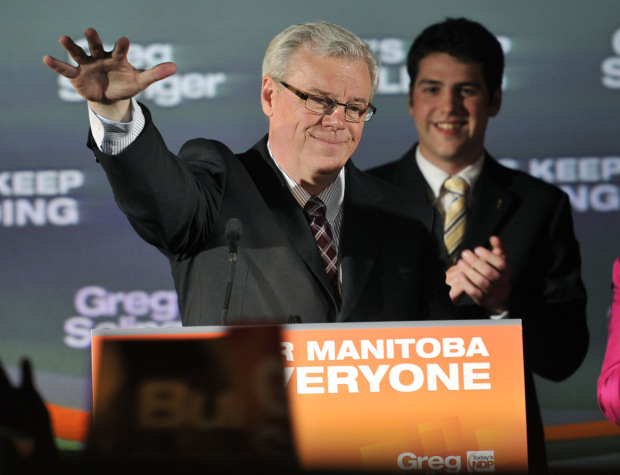“For me and my colleagues we knew that deciding to raise the PST by one point on the dollar meant that the next election campaign had officially begun,” said Liam Martin, Manitoba Premier Greg Selinger’s chief of staff, in an address to the NDP faithful at their AGM in May.
Conventional wisdom would state that the phrases “raise the PST” and “election campaign” not be spoken in the same sentence by members of the government, let alone the man who will be tasked with creating the winning conditions for an unprecedented fifth consecutive victory for the New Democrats. One would have assumed the NDP would want to weather the initial storm of outrage about the PST and hope voters have forgotten about it by the time the next election rolls around. Judging from Martin’s comments, though, it appears they’ve chosen a different tact.
[related_content slugs=”what-a-relevant-manitoba-liberal-party-could-accomplish,do-or-die-the-last-gasp-of-the-manitoba-liberals,bill-18-manitoba-tories-championing-old-ideas-while-world-moves-on” description=”More from Kelly McCrae” position=”right”]
Martin went on to say that the PST increase has “smoked out” Brian Pallister and his PC Party. To Pallister’s credit, he hasn’t allowed his party to sit back and ride a wave of populist anger about the tax increase. After saying a PC government would cut the tax down to the current seven per cent the party released a list of measures they would take to make up for the loss of tax revenue. The measures include things like “improving government procurement processes” and eliminating public funding for parties. The more drastic measures that the NDP and its supporters have already focused on are a civil service “hiring chill” and an across the board one per cent cut on government spending.
A staple of Pallister’s stump speech when running to become leader of the party last year was an acronym: “WIN.” While he occasionally changed what the “N” stood for, it usually was “not the NDP.” A not so subtle jab at the 2011 PC campaign which was criticized for a leftward turn in an attempt to lure moderate voters, but agitated many of the party’s base. After becoming leader Pallister has continued to use the phrase, making it clear that under his leadership the party will not attempt to form government by trying to “out NDP the NDP.” The party will look to provide a clear alternative to the government and offer a genuine change to Manitoban voters.
From Martin’s comments we can assume this is exactly what the NDP is hoping for. Even if Pallister wasn’t championing cuts in government spending, the NDP would still accuse him of doing so. It worked well when they branded Hugh McFadyen a “privatizer,” despite promising to be anything but. With the PC party actually saying they’ll make cuts it makes the attacks a little more genuine.
The fact that the NDP are publicly talking about fighting an election on a tax increase, likely means they believe they can win on it. This speaks volumes about the Manitoba electorate. There are very few jurisdictions in North America where the thought wouldn’t be considered a sure loser, yet here we are. Of course the NDP will not only need to defend the tax increase, but also the autocratic process by which they are implementing the PST hike, along with the fact that they promised last election that the cut wouldn’t happen under their watch.
It’s clear that the NDP are willing to deal with the anger of upset tax payers as long as they believe they can keep their base of left wing supporters and appeal to civil servants with a strong dose of fear mongering that they would all lose their jobs if the other guys get in. With the PC Party staking their ground both major parties have clearly aligned on different sides. Manitobans appear to have a clear choice between high taxes and a large civil service or lower taxes and a Manitoba economy that will eventually not be so reliant on the public sector.
The optimist in me hopes for a healthy debate over the issues and educated voters choosing which party best suits their vision for Manitoba. In reality these issues will likely serve as a foundation for partisan mud-slinging where the real issues are ignored, but even if the attacks are rooted on some sort of policy idea that’s at least a little encouraging. If the NDP runs and wins an election on tax increases to fund government jobs surely Manitoba has become a one-party province and would be incredibly difficult to see how any party will defeat them in any time soon.
—
Kelly McCrae is a former PC caucus staffer and is currently a public affairs consultant with Grey Owl Public Affairs. Follow him at: @kellymccrae
